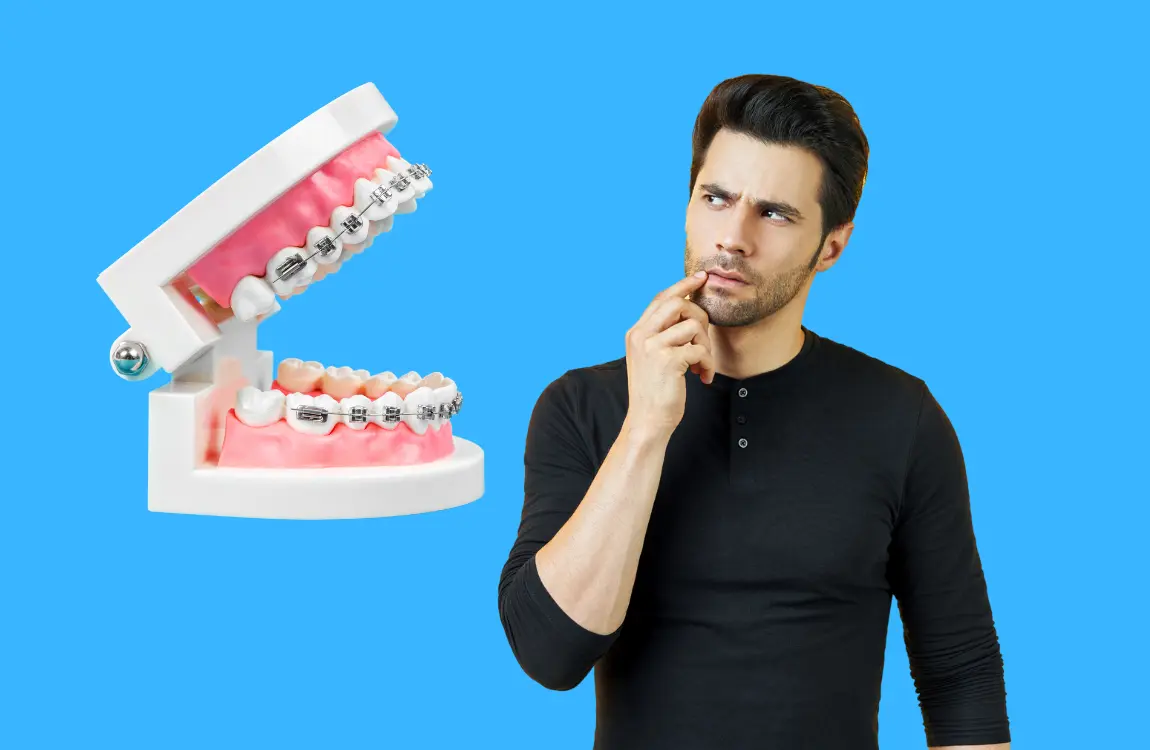Have you ever wondered if braces could help you achieve a healthier smile? While many kids get braces at a young age, you might still be unsure if they’re right for you. This blog will assist you through the signs that braces may benefit you.
Dr. Polina Ingberman at Brace Central shares, “There are a few signs to look for. Crowding or spacing problems are common reasons people seek braces. Dentists may also recommend braces for bite issues or alignment irregularities. For younger patients, early orthodontic screenings can help prevent severe problems and make treatment easier later.”
Signs You Might Need Braces
Difficulty Biting or Chewing
Eating certain foods like apples or steak can be uncomfortable when your teeth don’t meet properly. Over time, this can cause pain and wear down your teeth.
Crowded or Overlapping Teeth
If your teeth overlap due to a lack of space, they can be harder to clean. This increases the risk of cavities and gum disease.
Gaps Between Teeth
Large gaps between teeth can trap food, leading to gum issues and bad breath. These gaps might also make you feel self-conscious about your smile.
Jaw Pain or Clicking Sounds
Jaw pain or clicking sounds could indicate alignment issues or other concerns, such as TMJ disorders. An evaluation by a professional can determine the cause and discuss potential treatment options, including braces.
Speech Problems
Issues like an overbite or underbite can make it difficult to speak clearly. This can result in a lisp or trouble pronouncing certain sounds.
Teeth Grinding or Clenching
Teeth grinding or clenching may sometimes be linked to misalignment. Braces can address alignment issues, which could reduce grinding, but additional treatments might be necessary.
Visible Bite Problems
Problems like overbites, underbites, or crossbites can strain your jaw and make eating difficult. Braces can help correct these alignment issues.
Difficulty Cleaning Teeth
Crooked teeth are harder to brush and floss properly, increasing the risk of cavities and gum disease.
Dentist or Orthodontist Advice
Regular dental check-ups can catch issues you might not notice. Your dentist or orthodontist can recommend braces if needed to keep your smile healthy.
How to Know if Your Child Needs Braces
The American Association of Orthodontists (AAO) suggests children have their first orthodontic evaluation by age 7. These signs can indicate the need for orthodontic care, but a professional evaluation is necessary to determine the best approach for your child.
– Crooked or crowded teeth
– Gaps between teeth
– Trouble biting or chewing food
– Teeth that don’t align properly
– Jaw pain or clicking sounds
– Losing baby teeth too early or too late
At What Age Should You Get Braces?
Orthodontic care can help people of all ages. Children as young as 7 can benefit from an initial evaluation to catch potential problems early. Teens and adults can improve both their smiles and oral health with braces.
What Are the Different Types of Braces?
- Traditional Metal Braces: These are the most noticeable but also highly effective.
- Ceramic Braces: A less visible option that blends in with your teeth.
- Invisalign Clear Aligners: These are removable, clear trays that gradually shift teeth into place.
Common Misconceptions About Getting Braces
Braces are only for kids or teens
This isn’t true—adults can also get braces! As long as your teeth and gums are healthy, it’s never too late to improve your smile.
Braces take forever to work
Most braces treatments last 1 to 3 years, but many patients notice changes within the first few months.
You can’t eat your favorite foods with braces
While you’ll need to avoid sticky, hard, or chewy foods, most meals are still fine. Your orthodontist will give you tips for eating with braces.
Braces are just for cosmetic reasons
Braces not only improve the appearance of your smile but also promote better oral health by aligning teeth.
Braces always leave marks on your teeth
With proper oral care, braces should not leave marks on your teeth. Following your orthodontist’s cleaning recommendations can prevent stains or damage.
What to Do Next
If you’ve noticed any problems, don’t wait to take the next step toward a healthier, more confident smile. At Brace Central, we offer comprehensive evaluations designed to your needs. Take the first step toward a healthier, more confident smile. Schedule your consultation with Brace Central today and let us guide you to your best smile yet.
Frequently Asked Questions
How long do I need to wear braces?
Most treatments last between 18 and 24 months. Your orthodontist will provide a personalized plan with an estimated timeline.
Can I eat normally with braces?
Yes, but avoid sticky, chewy, and hard foods. Cutting larger items like apples into smaller pieces can help protect your braces.
How do I take care of my braces?
Brush at least three times a day and floss daily. Special orthodontic brushes can help clean around the wires.
Can braces fix bite problems?
Yes, braces can correct overbites, underbites, crossbites, and other bite issues.
What happens after my braces come off?
You’ll need to wear a retainer to keep your teeth from shifting. Retainers are custom-made and typically worn at night after the initial months.
Can I play sports while wearing braces?
Absolutely! Just wear a mouthguard to protect your braces and teeth during sports activities.
Disclaimer
This article is for educational purposes only and is not medical advice. Consult your orthodontist for any medical concerns or before starting any treatment. Do not ignore professional medical advice due to the information read here. The authors are not responsible for any outcomes from the use of this information.

